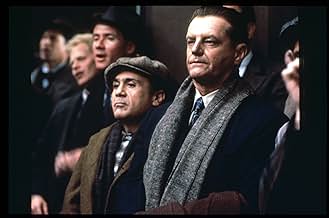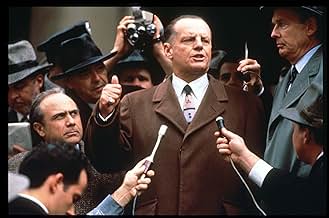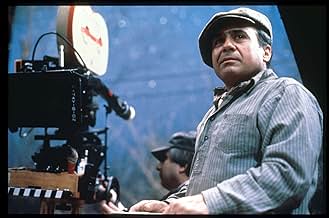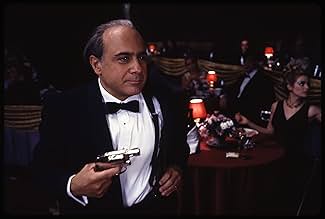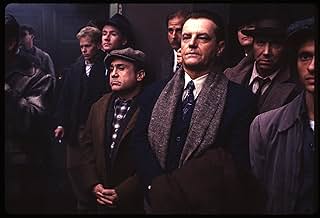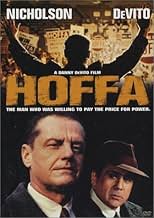AVALIAÇÃO DA IMDb
6,6/10
26 mil
SUA AVALIAÇÃO
A história da famosa figura da união americana Jimmy Hoffa, que organiza greves, lida com membros do sindicato do crime organizado e desaparece misteriosamente em 1975.A história da famosa figura da união americana Jimmy Hoffa, que organiza greves, lida com membros do sindicato do crime organizado e desaparece misteriosamente em 1975.A história da famosa figura da união americana Jimmy Hoffa, que organiza greves, lida com membros do sindicato do crime organizado e desaparece misteriosamente em 1975.
- Indicado a 2 Oscars
- 2 vitórias e 6 indicações no total
Joe Greco
- Loading Foreman
- (as Joe V. Greco)
Avaliações em destaque
A film based on the story of legendary union figure Jimmy Hoffa (played here by Jack Nicholson).
Can I first say this was strange casting for Bobby Kennedy? It just seems like someone doing a very poor Kennedy impersonation, not a serious attempt to really capture him. Which is unfortunate, given how central his role is. (This film, more than anything, seems to be Hoffa versus Kennedy.) The Nicholson casting is not perfect, either, because it is hard to hide his distinctive voice... but I think he pulls it off ,and the makeup helps.
The Hoffa story is a fascinating one, and one that deserves to be explored on film again. This was 1992, and I write this in 2015. In the past two decades, more memoirs have been written, more government documents released... we need another biopic, and maybe a really serious documentary?
Can I first say this was strange casting for Bobby Kennedy? It just seems like someone doing a very poor Kennedy impersonation, not a serious attempt to really capture him. Which is unfortunate, given how central his role is. (This film, more than anything, seems to be Hoffa versus Kennedy.) The Nicholson casting is not perfect, either, because it is hard to hide his distinctive voice... but I think he pulls it off ,and the makeup helps.
The Hoffa story is a fascinating one, and one that deserves to be explored on film again. This was 1992, and I write this in 2015. In the past two decades, more memoirs have been written, more government documents released... we need another biopic, and maybe a really serious documentary?
James Riddle Hoffa was probably one of the most enigmatic union leaders in this history of our country. As an important labor organizer during the over the road trucker strikes in the 1930s, he accomplished many things that made possible the emergence of the Teamsters Union as a major political force for several decades afterward. At the same time, he fell into a trap that bedevils many a fighter who perceives her/himself as a "people's champion"- he convinced himself that he had to fight fire with fire, and in the end, it devoured him. Secondly, Hoffa did not have the money, the support or the political sophistication of a Robert Kennedy. This'll finish you in the United States. Despite all our bombast about law and order, the country loves its shady political characters charming and slick, or the medicine show man, witness: Clinton, Reagan, Bush. The awkward and openly coarse need not apply, witness Nixon, Hoffa, Lott. David Mamet understands that, and that's why his version of Hoffa's life works.
Mamet's Hoffa knows the Kennedy family built their fortune out of rum running to a large extent, and he sees no difference between their corruption and his own compromises. At least, Hoffa tells himself, his own deals with the devil serve something larger then his immediate family, they serve the membership of the union. And this was very true, which is why a fair number of Teamsters still swear by the name Jimmy Hoffa. Nicholson's snide asides to his "betters" completely captures the class war basis that motivated the actual man's actions. Anyone who has been through an actual labor dispute and has been witness to the patronizing communications that come through a company eager to crush a union effort knows full well what fired up Jimmy Hoffa, even as we turn aside from the path he took.
The film succeeds because De Vito, Nicholson and Mamet understand what pushed the labor movement forward, and they understand its contradictions. Most important, they understand why those contradictions overwhelmed a man as gifted as Jimmy Hoffa, and this is what makes it better then your average Hollywood drama about labor. Hoffa is a film about working class attitude that gets beneath the usual dismissals of working class concerns, and as such, deserves respect. The powers that be have every legend about their leadership. It's time the working class was allowed legends about its own once again, provided we understand that they are legends, and therefore laden with much myth. The very real larger then life qualities of Jimmy Hoffa, however, make this a film worth more then one critical glance.
Mamet's Hoffa knows the Kennedy family built their fortune out of rum running to a large extent, and he sees no difference between their corruption and his own compromises. At least, Hoffa tells himself, his own deals with the devil serve something larger then his immediate family, they serve the membership of the union. And this was very true, which is why a fair number of Teamsters still swear by the name Jimmy Hoffa. Nicholson's snide asides to his "betters" completely captures the class war basis that motivated the actual man's actions. Anyone who has been through an actual labor dispute and has been witness to the patronizing communications that come through a company eager to crush a union effort knows full well what fired up Jimmy Hoffa, even as we turn aside from the path he took.
The film succeeds because De Vito, Nicholson and Mamet understand what pushed the labor movement forward, and they understand its contradictions. Most important, they understand why those contradictions overwhelmed a man as gifted as Jimmy Hoffa, and this is what makes it better then your average Hollywood drama about labor. Hoffa is a film about working class attitude that gets beneath the usual dismissals of working class concerns, and as such, deserves respect. The powers that be have every legend about their leadership. It's time the working class was allowed legends about its own once again, provided we understand that they are legends, and therefore laden with much myth. The very real larger then life qualities of Jimmy Hoffa, however, make this a film worth more then one critical glance.
Hoffa is a surprising film which from time to time arises to keep alive the memory of the late Teamster president. Told in flash back form, the film ably describes the dramatic rise and fall of the popular labor leader. Indeed, with Nickleson's portrayal the viewer is convinced of the confrontational life of the man who became synonymous with the International union. Re-enacting the turbulent rise of Hoffa, viewers are treated to the fabulous talents of some of the giants of the silver screen. Few could argue that Jack Nicholson as James R. 'Jimmy' Hoffa is nothing short of magical. In addition there is Danny DeVito who as Bobby Ciaro, in my opinion steals the show. Further enriching the cast is Armand Assante as Carol D'Allesandro, the mob boss who assured Jimmy's rise to power and then later is suspect in the teamster's mysterious disappearance. J.T. Walsh is excellent as Frank Fitzsimmons. The dramatic film superbly encapsulates the early violent trials, successful triumphs and eventual tragedy of the great, but troubled teamster president. ****
While it is one of Nicholson's most challenging roles, as a viewer you find yourself more attached to director and co-star DeVito, who practically sunk every penny he owned into the making of this film. While the film did garner some Golden Globe nominations, altogether the film was a commercial and personal flop for all involved. The problem may have been that the world was not ready for this story. Nicholson is quite good as Hoffa, but one almost ignores the performance when you think of the personal attachment director DeVito had to the project. It is quite unfortunate because DeVito is interesting in a rare dramatic role. David Mamet did write a fine script and there is fine support from J.T.Walsh, Robert Prosky and Armand Assante.
In ten years, this film will be a classic!
In ten years, this film will be a classic!
All too often Jack Nicholson just coasts and plays his stock character. Sometimes it's boring, occasionally it's insulting, but in "Hoffa" Nicholson puts aside the sneer and the leer and delivers a knockout performance. Although he doesn't really look that much like the Teamster boss, Nicholson captures the man's aura perfectly. It's more than just nailing the vocal rhythms and inflections or mastering Hoffa's body language, you feel Nicholson is conveying the inner man as well. This is truly a multi-dimensional interpretation and it's absolutely stunning.
Unfortunately, the film is an inadequate showcase for Nicholson's talents. The story begins in 1975 on what presumably was the last day of Hoffa's life as he and his pal Bobby Ciaro (Danny DeVito) wait for some people to show up for a meeting at a Michigan roadhouse. They wait a long time which allows Bobby to recall many incidents in Hoffa's extraordinary career as a union organizer.
There are two problems with this. First Bobby, who's supposed to be something of an enforcer, is never credible. Although he's nearly always in view, he never seems to belong. Perhaps that's because he's entirely a creation of screenwriter David Mamet. Barely adequate as a story-telling device, Bobby's unfortunate insertion gives rise to the inevitable, more serious question: how much of this story is true?
If you accept Mamet's interpretation, Hoffa was a victim of a trusted associate, the Government, and the Mob, but foremost a hero because he fought for the working man. Fair enough. But when you watch "Hoffa" you don't really get a clear sense of why all this was so. Motivations are largely absent. The flashbacks pass by but you feel these are merely sketches or outlines, often presented without clear context. Some are believable, others seem to be mere speculation, still others, such as the scenes with Robert Prosky or the enormous riot sequence, implausible. Was Prosky's character real? Did so many people actually die? Ask Bobby, because in many ways it's as much his story as Hoffa's; but as we know, Bobby is pure fiction.
Mamet has been quoted as saying audiences look more for drama than for information. Fine, and who'd want to see Ken Burns' take on the Teamsters. But "Hoffa", for all its huffing and puffing, lacks the drama of Paul Schrader's "Blue Collar" or the better Mob pictures.
Recommended solely for Nicholson's performance.
Unfortunately, the film is an inadequate showcase for Nicholson's talents. The story begins in 1975 on what presumably was the last day of Hoffa's life as he and his pal Bobby Ciaro (Danny DeVito) wait for some people to show up for a meeting at a Michigan roadhouse. They wait a long time which allows Bobby to recall many incidents in Hoffa's extraordinary career as a union organizer.
There are two problems with this. First Bobby, who's supposed to be something of an enforcer, is never credible. Although he's nearly always in view, he never seems to belong. Perhaps that's because he's entirely a creation of screenwriter David Mamet. Barely adequate as a story-telling device, Bobby's unfortunate insertion gives rise to the inevitable, more serious question: how much of this story is true?
If you accept Mamet's interpretation, Hoffa was a victim of a trusted associate, the Government, and the Mob, but foremost a hero because he fought for the working man. Fair enough. But when you watch "Hoffa" you don't really get a clear sense of why all this was so. Motivations are largely absent. The flashbacks pass by but you feel these are merely sketches or outlines, often presented without clear context. Some are believable, others seem to be mere speculation, still others, such as the scenes with Robert Prosky or the enormous riot sequence, implausible. Was Prosky's character real? Did so many people actually die? Ask Bobby, because in many ways it's as much his story as Hoffa's; but as we know, Bobby is pure fiction.
Mamet has been quoted as saying audiences look more for drama than for information. Fine, and who'd want to see Ken Burns' take on the Teamsters. But "Hoffa", for all its huffing and puffing, lacks the drama of Paul Schrader's "Blue Collar" or the better Mob pictures.
Recommended solely for Nicholson's performance.
Você sabia?
- CuriosidadesThe only major make-up Jack Nicholson had to wear to become Jimmy Hoffa was fake nose and a set of false upper teeth (as seen in the behind-the-scenes footage on the DVD).
- Erros de gravaçãoWhen Jimmy and Billy torch bomb the building, they create a blast so intense, it blows out the passenger side window on Bobby's truck. Yet in the following shots, the window goes from being intact, to being shattered.
- Citações
Jimmy Hoffa: If a guy's close to you, you can't slight 'im. You can't slight that guy. A real grievance can be resolved; differences can be resolved. But an imaginary hurt, a slight - that motherfucker gonna hate you 'til the day he dies.
- Cenas durante ou pós-créditosthere are no opening credits and the title of the film at the beginning.
- Versões alternativasOn a special laserdisc edition, Danny DeVito hosts a supplemental portion of the disc with outtakes, including a scene where Hoffa perfectly shoots a beer bottle with a rifle.
- Trilhas sonorasLet's Make Love Tonight
Written, Produced and Performed by Nicky Addeo
Principais escolhas
Faça login para avaliar e ver a lista de recomendações personalizadas
- How long is Hoffa?Fornecido pela Alexa
Detalhes
Bilheteria
- Orçamento
- US$ 35.000.000 (estimativa)
- Faturamento bruto nos EUA e Canadá
- US$ 24.276.506
- Fim de semana de estreia nos EUA e Canadá
- US$ 6.406.012
- 27 de dez. de 1992
- Faturamento bruto mundial
- US$ 29.302.121
- Tempo de duração
- 2 h 20 min(140 min)
- Cor
- Proporção
- 2.39 : 1
Contribua para esta página
Sugerir uma alteração ou adicionar conteúdo ausente



